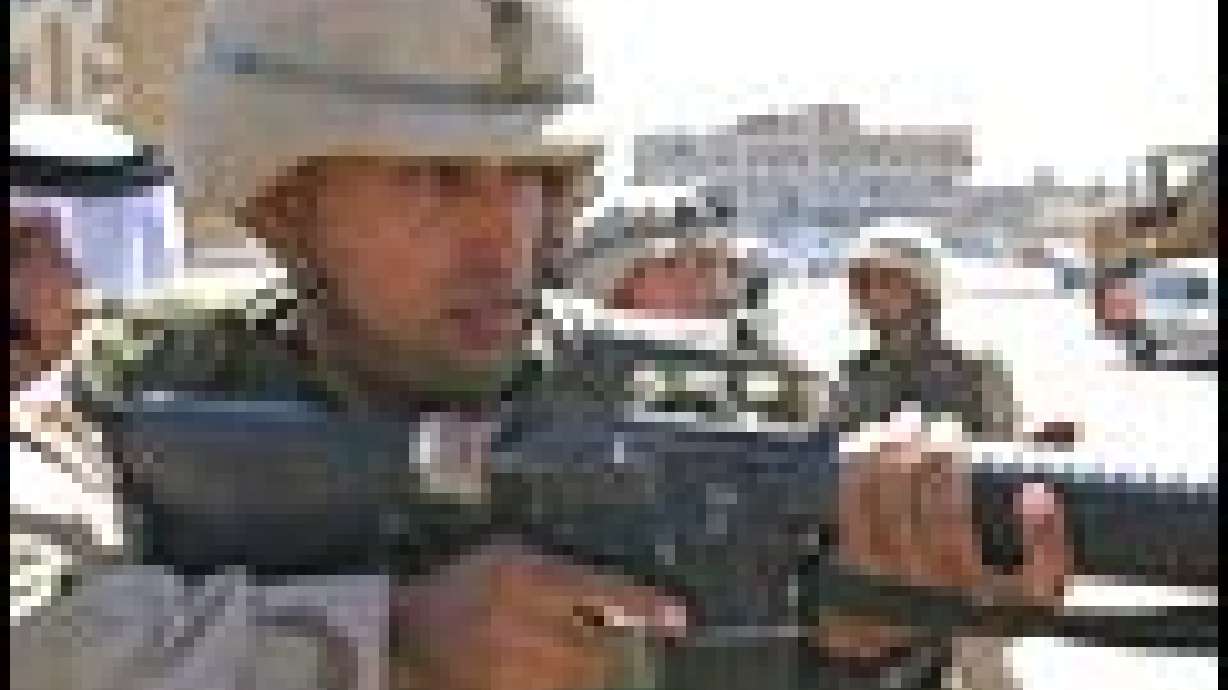Estimated read time: 4-5 minutes
This archived news story is available only for your personal, non-commercial use. Information in the story may be outdated or superseded by additional information. Reading or replaying the story in its archived form does not constitute a republication of the story.
BAQUBAH, Iraq (AP) - An armed Iranian opposition group operating northeast of Baghdad was negotiating its surrender Friday after the U.S. military ordered it to lay down weapons or face destruction, American officials said.
The Mujahedeen Khalq, which operated for years from Saddam Hussein's Iraq in its efforts to undermine Iran's religious regime, was surrounded by U.S. forces outside this town northeast of Baghdad, said Lt. Col. Robert Daldivia of the U.S. Army's 4th Infantry Division.
"As far as I know, they are agreeing to capitulate at this time," said Capt. Josh Felker, public affairs officer of the 4th Infantry's Warhorse Brigade. He said Gen. Ray Odierno, the 4th Infantry's commander, was in the Mujahedeen Khalq's main camp, Camp Ashraf, to negotiate the surrender.
U.S. military talking points about the negotiations, obtained by The Associated Press, gave the following guidance: "MEK forces will be destroyed or compelled to surrender, leading to disarmament and detention."
Under the U.S. orders, the Mujahedeen Khalq must disarm, though they can keep their personal arms temporarily for self-defense. They will be barred from manning checkpoints on the roads around Baqubah and must go to containment areas, Felker said.
Thousands of Mujahedeen Khalq are believed to be in the area, although the United States says it is unsure of the exact number.
The Mujahedeen Khalq, or People's Warriors, operated in prewar Iraq with Saddam Hussein's blessing. They have several camps near Baqubah, 45 miles from Baghdad. U.S. troops said they had been prepared for full-scale combat before the negotiations began.
The United States signed a truce on April 15 with the Mujahedeen Khalq, allowing the group to keep its weapons to defend itself against Iranian-backed attacks. At the time, the U.S. State Department called the agreement "a prelude to the group's surrender."
"This has been in the works for a while. The cease-fire was a stepping stone to the capitulation agreement," Felker said.
But reports of roadblock confrontations in recent days suggested the group had continued playing an active, armed role in the region _ a challenge to the United States' authority as Iraq's military occupier.
U.S. military commanders "don't want two armed forces in the area," Felker said.
In the past, the United States called the Mujahedeen Khalq a terrorist organization. During the 1970s, the group was accused in attacks that killed several U.S. military personnel and civilians working on defense projects in Iran, although the group denies targeting Americans. It reportedly backed the takeover of the U.S. Embassy in Tehran in 1979 but later broke with Iran's government.
Iran's clerical government has criticized U.S. policy toward the group, saying it was hypocritical of the United States to describe it as terrorist yet still sanction its existence.
In Baghdad, exactly a month after U.S. troops hauled down Saddam's statue, civilian U.S. officials said Friday they had located the main vaults of the central bank, obtained some keys and combinations and sent Iraqi investigators inside.
The vaults apparently escaped the looting and pillage that swept Baghdad after Saddam's regime fell, U.S. Treasury Department officials said at a briefing. They said the safes contain U.S. dollars, Iraqi dinars, gold and items from the museum put there for safekeeping. They also were flooded.
"We went down and waded in the water," said George Mullinax, a Treasury official who is serving as senior adviser to the central bank. It was not clear where the water came from.
He said more than $900 million was removed from the bank the day before the war began March 20.
A Treasury Department team is due in Iraq this month to look for hidden government accounts. Mullinax said he had asked that a portion of the $1.7 billion in frozen Iraqi assets in the United States be set aside for use as central bank reserves.
U.S. officials also announced that the central bank would support the 10,000-dinar note, which _ like all other currency still being used in Iraq _ bears Saddam's image.
Many Iraqis are suspicious of 10,000-dinar notes, which are worth about $5, and will not accept them because they believe currency in that denomination could be refused by government institutions.
(Copyright 2003 The Associated Press. All rights reserved.)








